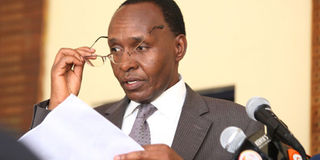ICC: ‘How Mutea Iringo plotted to fix Ruto’

Principal Secretary for Interior and Coordination of National Government Mutea Iringo. Deputy President William Ruto’s defence Friday claimed Mr Iringo and the President’s advisor on political affairs Nancy Gitau recruited ICC witnesses to fix the DP. PHOTO | BILLY MUTAI| FILE
What you need to know:
- During cross examination of ICC witness P-0613, Mr Ruto’s lawyer, Shyamala Alagendra, said there were systematic plans to fix the DP in connection with the post-election violence by powerful men in government.
- Mr Iringo is alleged to have maintained close contact with Mr Rono in the 2009-2010 period, with the latter “acting as an agent for the Interior PS in managing the Waki Commission and potential ICC witnesses.”
- The witness said Ms Karua, who was minister in Kibaki’s administration, helped witnesses provide evidence to the Waki Commission, which was being used by the ICC to prosecute post-poll violence perpetrators.
Deputy President William Ruto’s defence Friday claimed Interior PS Mutea Iringo and the President’s advisor on political affairs Nancy Gitau recruited ICC witnesses to fix the DP.
The two were alleged to have funded the witness protection programme, and coordinated recruitment of witnesses to provide evidence to the Waki Commission to implicate Mr Ruto and the Orange Democratic Movement (ODM) party.
During cross examination of ICC witness P-0613, Mr Ruto’s lawyer, Shyamala Alagendra, said there were systematic plans to fix the DP in connection with the post-election violence by powerful men in government. The lawyer said cash was given to fund the witness protection programme.
Other people said to have tampered with witnesses and evidence-gathering were former Justice Minister and presidential aspirant Martha Karua, former MP Stephen Tarus, human rights activists Maina Kiai and David Koross and PNU activist in Rift Valley William Rono.
Mr Iringo is alleged to have maintained close contact with Mr Rono in the 2009-2010 period, with the latter “acting as an agent for the Interior PS in managing the Waki Commission and potential ICC witnesses.”
Ms Alagendra said that Mr Iringo and Ms Gitau “gave money to the ICC witness protection programme,” but the witness said she was not aware and thought the money came from the Kenya National Commission for Human Rights (KNCHR).
Ms Alagendra: Are you aware that money was given to witness protection programme by Mr Iringo and Ms Gitau?
Witness: No. I thought the money given to the programme came from KNHCR, not from someone’s pocket.
Lawyer: Are you aware Mr Rono worked with Mr Iringo and Ms Gitau to mobilise witnesses to falsely implicate Mr Ruto?
Witness: No. I didn’t hear about it.
Lawyer: Are you aware that between 2009-2010, Mr Rono continued to be in close contact with Mr Iringo with Mr Rono acting as an agent for Mr Iringo in managing the Waki Commission and potential ICC witnesses?
Witness: No.
The witness said Ms Karua, who was minister in Kibaki’s administration, helped witnesses provide evidence to the Waki Commission, which was being used by the ICC to prosecute post-poll violence perpetrators.
Mr Koross is alleged to have received over $20,000 through his NGO Center Against Torture, from the Swiss Embassy, with Mr Kiai acting as the link. Mr Koross is also alleged to have put himself as a witness so as to secure witness protection, Mr Ruto’s lawyer said.
Other alleged witness funders include Human Rights Watch, the US Agency for International Development (USaid), and the KNCHR, which got funding to investigate the post-election chaos and came up with the report, “Ballots to Bullets”.





